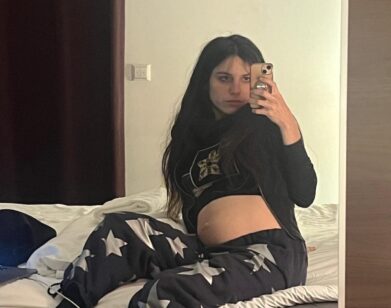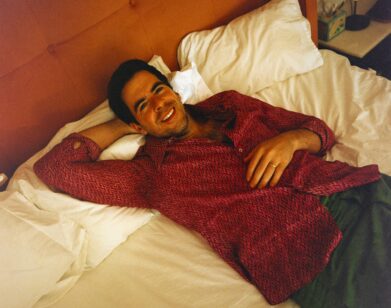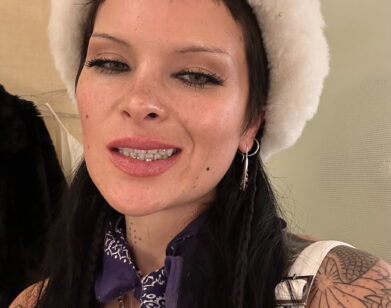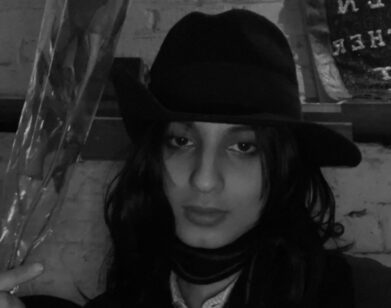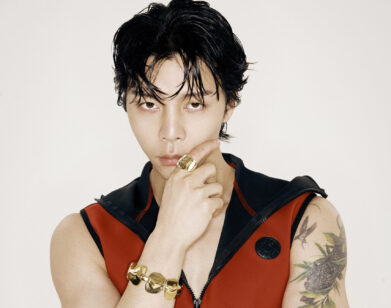Delta Spirit Soars Higher
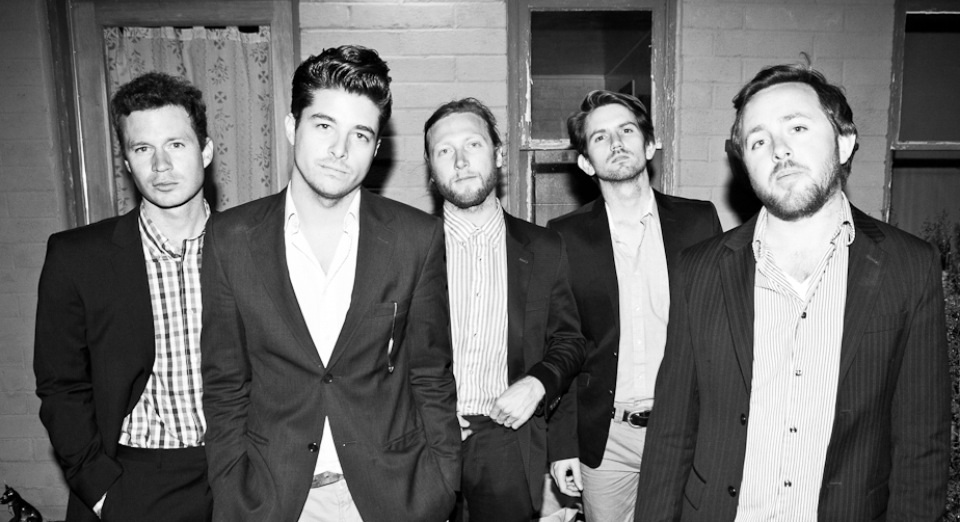
ABOVE (LEFT TO RIGHT): BRANDON YOUNG, MATT VASQUEZ, JON JAMESON, WILL MCLAREN, KELLY WINRICH.
When Delta Spirit frontman Matt Vasquez tells you his band wants to reach new heights with their music, he isn’t messing around. Late in the band’s set at last month’s Austin City Limits Festival, in the middle of the song “Trashcan,” Vasquez proved just how serious he is by scaling the AMD stage’s lightning rig and dangling—much to the delight of the crowd—some 70 feet in the air. If the whole scene came off as somewhat reckless (Vasquez had tripped over a monitor just minutes before), the message, at least, was clear: the band wasn’t going to let any boundaries, physical or otherwise, hold them back.
A slightly less literal iteration of this mission statement can be found on the group’s latest album, Delta Spirit, released in March. Working with veteran producer Chris Coady (Yeah Yeah Yeahs, Beach House, TV on the Radio), Delta Spirit sought to clear themselves of the Mumford-lite label that had followed them since their folksy 2008 debut, Ode to Sunshine, opting instead for hard-charging, shimmering electric guitars and bright rock melodies that evoke the best of the early ’90s rock renaissance. It’s a bold statement from a band looking to reinvent itself (they uprooted from Southern California to Brooklyn and added guitarist Will McLaren in the last year), and not one to be taken lightly.
Taking a break from the mid-day heat during ACL’s second day, Interview sat down with Vasquez, McLaren, and bandmates Jon Jameson, Brandon Young, and Kelly Winrich, in the festival’s press area to discuss their evolving sound, epic games of “would you rather,” and just what Vasquez was thinking as he climbed that stage.
JEFF OLOIZIA: Can you take me through exactly what happened yesterday?
KELLY WINRICH: Well, first Matt fell on his ass, which was funny. He literally tripped over the monitor and just went over backwards. And then he climbed… how high would that be?
BRANDON YOUNG: Amir said 70 feet.
WINRICH: That’s pretty wild.
MATT VASQUEZ: From the stage to the actual ground, I climbed to the top of the AMD.
OLOIZIA: Oh, sick.
VASQUEZ: Yeah, it was, it was really high. [laughs]
JON JAMESON: He scared the shit out of all of us.
OLOIZIA: Did you have any regrets once you got up there?
VASQUEZ: I felt bad, because my wife and my mom were watching me.
JAMESON: Did you feel bad that your band was watching?
VASQUEZ: I did feel bad for you guys, too. Jon was like, “I’m gonna run off stage.”
JAMESON: Yeah, I just started thinking about what I was going to do when Matt died. I was like, “I’m not going to walk up to his dead body. I’m just going to walk off stage and go home or something.”
YOUNG: The reality is, when he got to the top, there’s only two things that could have happened: he either lives or he dies.
WINRICH: He was doing fist pumps when he was up there. He would take one hand off and hold on with the other and I’d think, “Oh, this is it!” And then he’d go down a little more and fist pump, and I’m like, “Oh, here it comes!” [all laugh]
WILL McLAREN: We were watching a guy who just tripped over a monitor, so the chances of survival didn’t seem that hot.
OLOIZIA: Was it a spur-of-the-moment decision?
VASQUEZ: Yeah. I had a dream a couple months ago about doing it, but I died in my dream. I decided to do it while I was watching Asleep at the Wheel.
WINRICH: I thought if you die in your dream you die in real life?
VASQUEZ: That’s just if you watch Inception.
McLAREN: Or, uh…
VASQUEZ: The Matrix.
McLAREN: Maybe that’s the kind of stuff you would do differently at a festival versus your own show. [laughs]
OLOIZIA: Is this your first time playing ACL?
WINRICH: No, it’s actually our third time now. Right?
JAMESON: Yep.
WINRICH: I think the first time we played, it was really early in the day.
JAMESON: It was definitely our first exciting festival experience.
YOUNG: The crowd has grown for us, which has been great. It’s a great festival.
OLOIZIA: And are you around all weekend?
WILL MCLAREN: Some of us are.
McLAREN: Jon and I fly out early tomorrow. I just have to see Neil Young.
JAMESON: Yeah, staying for Neil tonight.
McLAREN: And Crazy Horse, man. That’s just one of the coolest bands of all time.
OLOIZIA: Do you have a favorite festival experience?
JAMESON: I think Lollapalooza this year was something pretty special for all of us. We played right before that big storm came and they had to evacuate everyone, so there was a lot of energy in the air, and a crazy amount of people showed up. It was Saturday show, the same time (2:15 p.m.), but as soon as we were done they had to put, like, 90,000 people on the street. So we played just in time.
YOUNG: We almost headlined Lollapalooza.
JAMESON: Yeah! [laughs]
YOUNG: It was a pretty great feeling.
OLOIZIA: You guys are from Southern California. Would you ascribe to having any California identity in terms of your music, or is it something that you don’t really think about?
McLAREN: I don’t think about it that much, personally. You don’t think about it while living in California, but then you move to New York and when you interact with people they’re like, “You’re not—where are you from? California?”
VASQUEZ: It’s definitely a part of us somehow. It’s like asking someone, “What’s your major?” Or “What’s your sign?”
JAMESON: We started touring pretty early and pretty seriously to the point where we didn’t feel like only a local band in Southern California, you know what I mean? We felt comfortable in a lot of cities: in Boston, and in Austin, and in New York… different places feel like, “Oh, we’ve been here so many times, you know? We’re home.”
VASQUEZ: We coined the term “America’s local band.” We’re on tour like nine months out of the year. We did, like, 300-plus dates one year.
OLOIZIA: Do you travel by bus?
YOUNG: We do now. We held out for so long just to pay rent.
OLOIZIA: Have you come up with any good tour bus games?
YOUNG: Sleep! I don’t think we’ve really had enough time on this tour.
WINRICH: We do a lot of “would you rathers.”
JAMESON: Yeah.
WINRICH: Like really fucked-up ones. Usually it’s in the morning when we’re not even awake yet. And I’ll just say something completely inappropriate just to keep everybody on their toes.
OLOIZIA: Any good ones?
VASQUEZ: Yeah, but you’re not gonna hear any of them.
WINRICH: Well, there’s one. Would you rather be a DJ or an angel? [all laugh]
YOUNG: I said that, actually. Write that one down. Copyright that one.
McLAREN: I think that raises a lot of questions—a lot of deep, soul-searching questions.
WINRICH: We’re talking about David Guetta, like, massive DJ.
OLOIZIA: I think that’s my new dating profile question.
McLAREN: Put that on your OkCupid.
OLOIZIA: [laughs] How did you approach this record differently than the previous two?
VASQUEZ: We have a fifth member; we have more experience with Pro Tools and recording; and we just wanted to leave and get past the genre thing, you know?
WINRICH: We got tired of having a label, and I remember we talked about just making a rock record. And then we kind of made a U-turn to something else. Just for a jumping-off point, we’d say, “Somebody throw out a genre and we’ll start with that.” So maybe someone would say, “Let’s make a soul record—like a Sam Cooke record with old-school, really simple lyrics, but cool drum grooves and great melodies.” It’s not like we’re gonna make that record, but we can start there and explore.
YOUNG: It goes back to what you asked us about locations and how they influenced us. Maybe bands that go to Laurel Canyon really do stick to, like, one niche, but we never really felt that way.
OLOIZIA: Right.
YOUNG: So I feel like each record is just going to be whatever we want to do. We never felt like we fell into one type of music.
McLAREN: Unless we sell a million records, then we’ll stay like that forever. [all laugh] A carbon copy, with just synonyms in the lyrics.
YOUNG: It’ll be like a Nickelback thing. It’ll be perfect.
OLOIZIA: Where do you feel your sound mostly comes from?
VASQUEZ: God.
YOUNG: A mixture of God and DJs.
OLOIZIA: Do you all have similar tastes?
VASQUEZ: No, we vary. I mean, we kind of have a center, but the center is always changing anyway.
JAMESON: We all have varied opinions, but we respect each other, so we’re always on our own discovering new things. Kelly and Matt write the bulk of the songs, and then we come together and find a place where we can all like it. We have to make it the forefront of our lives for the next two years, so it has to be something that all of us really love. That process is what goes into making an album for us.
JAMESON: I think it’s a testament to our tastes that we’re all going to see Neil Young tonight.
JAMESON: Right. Absolutely.
OLOIZIA: I read a quote from you, Matt, about how you have a preoccupation with death as a song subject.
VASQUEZ: [laughs] That’s one big one.
OLOIZIA: For this record or for all of them?
VASQUEZ: It’s just a topic. I mean, our finality—our myth—is a main force in most art. It’s the most argued about thing, the most thought about thing, the most feared thing.
JAMESON: Death and public speaking, right?
VASQUEZ: Right. We try to mix it up, because there’s so many different ways to write a song. Songs like “Idaho,” and “Ransom Man,” and “Home” are telling stories from different perspectives—from different people. It doesn’t have to be Kelly writing a song. He doesn’t have to be himself, just like I don’t have to be myself. You can create a fictional character just as easily as you can a real one. Those are great tools, and we should, as songwriters, be utilizing all that stuff. Not just sitting in a fucking niche.
OLOIZIA: It makes it more interesting to listen to.
VASQUEZ: Yeah, and that’s what our band is good about. We’re just having a conversation, and we’re showing that conversation to people, and then when we play it live—that’s a whole other animal. If you climb really high, you get people’s attention.
DELTA SPIRIT PLAYS IRVING PLAZA TUESDAY NIGHT. FOR MORE ON THE BAND, VISIT THEIR WEBSITE.

